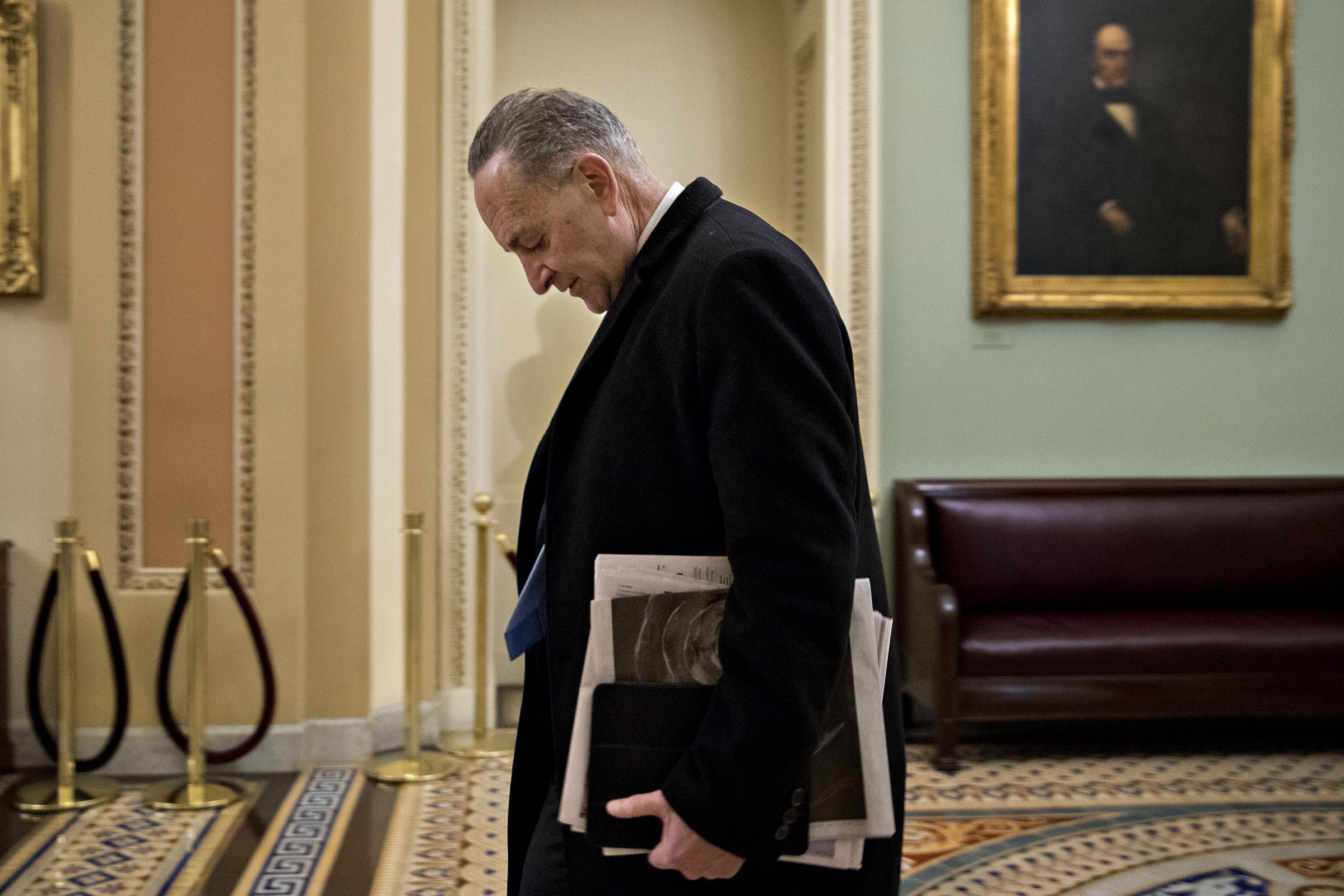
As the first government shutdown since 2013 took hold, liberal activists had one message for Democrats in Congress: hold the line. For months, they had pressured lawmakers to reject any Republican plan to pay for the operations of the federal government that did not protect immigrants who were illegally brought to the U.S. by their parents as children. Ending the standoff without securing a promise to safeguard the so-called Dreamers “would be the worst-case scenario,” said Ben Wikler, Washington director for the progressive group MoveOn. Activists warned lawmakers of the stakes. “If Democrats blink, then Republicans own them,” said Frank Sharry, director of the pro-immigration-reform group America’s Voice.
But blink they did. Less than 72 hours into the shutdown, a majority of Senate Democrats joined their Republican colleagues in a vote to fund the government until Feb. 8. In return they got promises–or, skeptics groused, vague assurances–from Senate Republican leader Mitch McConnell that he would schedule votes on immigration, border security and a broader spending plan in the coming weeks.
The left’s fury was palpable. The leader of one political action committee said the vote would hinder Democratic hopes of winning elections in November. The nation’s largest teachers’ union, the National Education Association, said the kick-the-can-down-the-road approach wasn’t working for its 3 million members. “Today’s cave by Senate Democrats–led by weak-kneed, right-of-center Democrats–is why people don’t believe the Democratic Party stands for anything,” Progressive Change Campaign Committee co-founder Stephanie Taylor said.
It was the fear of this reaction, from upstart advocacy groups and established behemoths alike, that drove so many Democrats to vote against the spending measure when the GOP first offered it earlier in January. And that same passion on the left explains why Senate Democrats with eyes on higher office–including Cory Booker, Kirsten Gillibrand and Elizabeth Warren, plus independent Bernie Sanders–resisted when party leaders moved to cut a deal with McConnell. They recognized that the base is restless. In a way, the Jan. 22 vote to reopen the government was the first policy melee in the party’s 2020 presidential primary battle.
But the Democrats’ defeat should not have been a surprise. Sure, the party’s left and right managed to row in the same direction for a while and agreed on a destination, but they never mapped their route. And they could have predicted that Republicans would not yield. “Turning the agenda over to Democrats who just shut down the government makes no sense,” John Cornyn of Texas, the Senate’s second-ranking Republican, told reporters on Jan. 21. “It seems like it encourages bad behavior.”
While Democrats were unified heading into the shutdown, the second-guessing began quickly. Some lawmakers heard from constituents back home–especially in states reliant on federal contractors. Others worried that the off-ramp for the shutdown hinged on Republicans’ caving. (Unlikely, if history were a guide.) For some Democrats, shutting down the government and programs they wanted to protect and expand ran counter to their core beliefs.
And so Democrats found themselves in a bind: squeezed between Republican conviction and the demands of their own base. In the end, they bought McConnell’s vague promises. Some Democrats argued that the concessions allowed the party to look responsible, while paving the way for gains in the fall’s midterm elections. “For the first time, we’re going to see actual votes [on immigration],” Senator Angus King, an independent who caucuses with the Democrats, said before the Jan. 22 vote. Maybe. McConnell never specifically promised a stand-alone bill on the Deferred Action for Childhood Arrivals program, which protects Dreamers. The next day, the third-ranking Republican in the House, Steve Scalise, declared McConnell’s work moot: “There were no commitments made in the House.” Which may prove the liberal critics’ case.
–With reporting by PHILIP ELLIOTT/WASHINGTON
More Must-Reads from TIME
- Donald Trump Is TIME's 2024 Person of the Year
- Why We Chose Trump as Person of the Year
- Is Intermittent Fasting Good or Bad for You?
- The 100 Must-Read Books of 2024
- The 20 Best Christmas TV Episodes
- Column: If Optimism Feels Ridiculous Now, Try Hope
- The Future of Climate Action Is Trade Policy
- Merle Bombardieri Is Helping People Make the Baby Decision
Contact us at letters@time.com